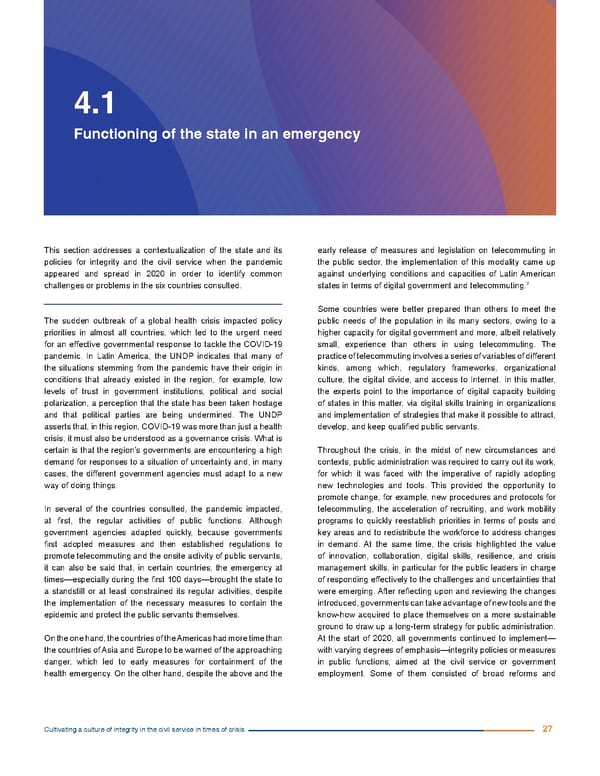4.1 Functioning of the state in an emergency This section addresses a contextualization of the state and its early release of measures and legislation on telecommuting in policies for integrity and the civil service when the pandemic the public sector, the implementation of this modality came up appeared and spread in 2020 in order to identify common against underlying conditions and capacities of Latin American challenges or problems in the six countries consulted. states in terms of digital government and telecommuting.7 Some countries were better prepared than others to meet the The sudden outbreak of a global health crisis impacted policy public needs of the population in its many sectors, owing to a priorities in almost all countries, which led to the urgent need higher capacity for digital government and more, albeit relatively for an effective governmental response to tackle the COVID-19 small, experience than others in using telecommuting. The pandemic. In Latin America, the UNDP indicates that many of practice of telecommuting involves a series of variables of different the situations stemming from the pandemic have their origin in kinds, among which, regulatory frameworks, organizational conditions that already existed in the region, for example, low culture, the digital divide, and access to Internet. In this matter, levels of trust in government institutions, political and social the experts point to the importance of digital capacity building polarization, a perception that the state has been taken hostage of states in this matter, via digital skills training in organizations and that political parties are being undermined. The UNDP and implementation of strategies that make it possible to attract, asserts that, in this region, COVID-19 was more than just a health develop, and keep qualified public servants. crisis; it must also be understood as a governance crisis. What is certain is that the region’s governments are encountering a high Throughout the crisis, in the midst of new circumstances and demand for responses to a situation of uncertainty and, in many contexts, public administration was required to carry out its work, cases, the different government agencies must adapt to a new for which it was faced with the imperative of rapidly adopting way of doing things. new technologies and tools. This provided the opportunity to promote change, for example, new procedures and protocols for In several of the countries consulted, the pandemic impacted, telecommuting, the acceleration of recruiting, and work mobility at first, the regular activities of public functions. Although programs to quickly reestablish priorities in terms of posts and government agencies adapted quickly, because governments key areas and to redistribute the workforce to address changes first adopted measures and then established regulations to in demand. At the same time, the crisis highlighted the value promote telecommuting and the onsite activity of public servants, of innovation, collaboration, digital skills, resilience, and crisis it can also be said that, in certain countries, the emergency at management skills, in particular for the public leaders in charge times—especially during the first 100 days—brought the state to of responding effectively to the challenges and uncertainties that a standstill or at least constrained its regular activities, despite were emerging. After reflecting upon and reviewing the changes the implementation of the necessary measures to contain the introduced, governments can take advantage of new tools and the epidemic and protect the public servants themselves. know-how acquired to place themselves on a more sustainable ground to draw up a long-term strategy for public administration. On the one hand, the countries of the Americas had more time than At the start of 2020, all governments continued to implement— the countries of Asia and Europe to be warned of the approaching with varying degrees of emphasis—integrity policies or measures danger, which led to early measures for containment of the in public functions, aimed at the civil service or government health emergency. On the other hand, despite the above and the employment. Some of them consisted of broad reforms and Cultivating a culture of integrity in the civil service in times of crisis 27
 Cultivating a culture of integrity in the civil service in times of crisis. Page 34 Page 36
Cultivating a culture of integrity in the civil service in times of crisis. Page 34 Page 36